| Article ID | Journal | Published Year | Pages | File Type |
|---|---|---|---|---|
| 5779292 | Procedia Earth and Planetary Science | 2017 | 4 Pages |
Abstract
Ensuring sealing integrity is key for long-term (>10 000 years) storage of CO2. Fault reactivation and leakage can potentially be impacted by (often slow) CO2-water-rock interactions. We used the predictive power of geochemical modelling coupled to mechanical experiments on simulated fault gouge material to study the impact of long-term CO2-water-rock interactions on fault friction and stability. Of particular interest were the conditions (mineralogical composition, temperature, slip velocity) that may result in stable (velocity-strengthening) vs. unstable (velocity-weakening), and thus potentially seismogenic, behavior. Our preliminary results show that this approach poses a promising avenue for assessing fault stability.
Related Topics
Physical Sciences and Engineering
Earth and Planetary Sciences
Atmospheric Science
Authors
Elisenda Bakker, John P. Kaszuba, Suzanne J.T. Hangx,
